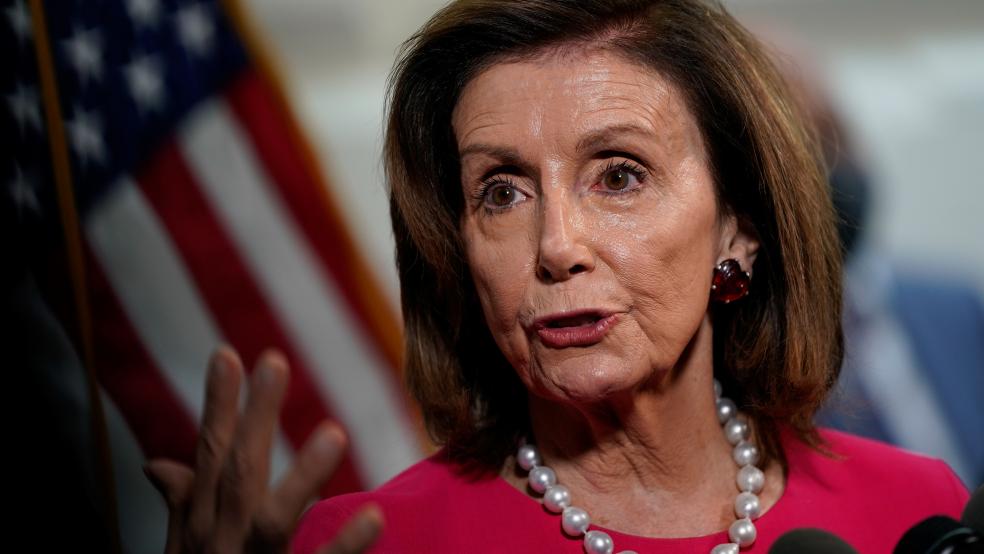House progressives are warning that they’re prepared to defy Speaker Nancy Pelosi and oppose a $1 trillion bipartisan infrastructure bill if she brings it up for a vote on Thursday.
The renewed threat of revolt comes after Pelosi (D-CA) reversed herself on Monday, reportedly telling members of her caucus that they could no longer wait for Democrats’ multitrillion-dollar budget reconciliation package of social spending and tax hikes before passing the infrastructure bill.
Pelosi had long insisted that the two pieces of legislation were tied together. “There ain't gonna be no bipartisan bill unless we're going to have a reconciliation bill," she said way back in June. But she also promised renegade centrists last month that she would bring the infrastructure bill up for a standalone vote this week.
With the self-imposed deadline looming and little progress toward resolving intraparty differences on the reconciliation package, Pelosi reportedly told her members Monday evening that she would push ahead with the infrastructure vote since it has become clear that negotiations between the White House, House and Senate on the second bill need more time.
“It all changed, so our approach had to change," Pelosi told her members Monday, according to Politico. She reportedly added that her shift was made necessary once it became apparent that the proposed $3.5 trillion reconciliation package would have to be pared back, and said that President Joe Biden and Senate Majority Leader Chuck Schumer are still pressing centrist Sens. Joe Manchin (D-WV) and Kyrsten Sinema (D-AZ) to spell out what spending level they’d accept. "We are not going to pass a bill that won’t pass the Senate. And that's why we have to come up with a number," Pelosi reportedly told her caucus. "But we're not there yet.”
Pelosi’s delinking the two bills poses a challenge to House progressives — and calls into question the long-term prospects of passing a reconciliation package. “Pelosi is basically asking progressives to trust her that Manchin and Sinema will agree to a package that the broader Democratic Party will back,” says Punchbowl News. That’s an awfully big ask. The only insurance policy progressives have is the infrastructure bill. Why would they give that up at this point -- especially when they have no true deadline.”
It’s no surprise then that progressives insist they won’t fold. Rep. Pramila Jayapal (D-WA), chair of the Congressional Progressive Caucus, indicated after a meeting with her members Tuesday that a majority of her 96 lawmakers are ready to vote against the infrastructure bill without a firm commitment on the social safety net package.
In a statement that seemed designed to ensure that progressives aren’t portrayed as radical obstructionists, Jayapal emphasized the popularity of items in the larger bill. “This agenda is not some fringe wish list: it is the president’s agenda, the Democratic agenda, and what we all promised voters when they delivered us the House, Senate, and White House. It is supported by nearly every Democrat in Congress and is overwhelmingly backed by the American people,” Jayapal said. “Progressives will vote for both bills, but a majority of our members will only vote for the infrastructure bill after the president’s visionary Build Back Better Act passes.”
Rep. Jan Schakowsky (D-IL), a Pelosi ally, told The Hill Tuesday that if the infrastructure bill is called to a vote, it will fail. And Senate Budget Committee Chair Bernie Sanders (I-VT) warned in a statement that delinking the two pieces of legislation could lead to the reconciliation package being scuttles. “If the bipartisan infrastructure bill is passed on its own on Thursday, this will be in violation of an agreement that was reached within the Democratic Caucus in Congress,” he said. “More importantly, it will end all leverage that we have to pass a major reconciliation bill.”
‘Captive’ to Manchin and Sinema: Biden met at the White House Tuesday with two Senate holdouts, Sens. Joe Manchin (D-WV) and Kyrsten Sinema (D-AZ). The White House and fellow Democrats have been pressing both senators to clarify their demands, and House Majority Leader Steny Hoyer reportedly said Tuesday that an agreement with Manchin and Sinema would be “critical” for Democrats to be able to move forward.
“The infighting and uncertainty have highlighted the fact that, for all the small signs of progress that have emerged in recent days, Democrats pushing Biden’s agenda remain captive to Manchin and Sinema, the two centrists who oppose the president’s favored $3.5 trillion social benefits plan, but have also refused to reveal what level of new spending they’ll support,” The Hill’s Mike Lillies and Scott Wong write.
That continued Tuesday, as the potentially pivotal talks with Biden apparently failed to produce any immediate breakthrough.
Pelosi’s options: Biden and Democratic leaders have two days to try to solidify a framework for their budget reconciliation bill in hopes that they can reassure progressives that the package isn’t doomed. If enough progressives can be convinced to support the infrastructure bill, it can still pass on Thursday. If not, progressives have the numbers to block it. Pelosi could also decide to postpone the infrastructure vote.
“All of these options present risks to Democrats because one faction could be so alienated and angered that it makes it difficult for Pelosi to manage her caucus going forward,” Brian Gardner, chief Washington policy strategist at investment bank Stifel, wrote in a note to clients Tuesday.
Given those scenarios, Gardner suggested that a delay pushing both pieces of legislation into October or even November is the most likely outcome.
Budget
Pelosi Faces Liberal Revolt on Infrastructure Plan

REUTERS/Elizabeth Frantz




